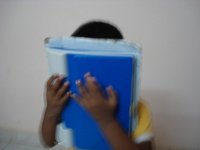Finding Students’ Hidden Strengths and Passions
Your content has been saved!
Go to My Saved Content.Rabbi Brad Hirschfield is the President of the National Jewish Center for Learning and Leadership and he has spent a lot of time thinking about how to inspire both. He has some ideas about how we can inspire our students by helping them find their hidden strengths and passions.
To use the word "hidden" may not be quite accurate because often, strengths are hidden by lack of opportunity to display them. Too often, when students are in school, they are not looked at in terms of their strengths; rather, there is a focus on remediating their deficits. This is rarely a source of inspiration for anyone. What ends up happening is that kids' strengths and passions are either hidden from their educators or worse, they become hidden from themselves because they do not get encouraged.
So what can educators do? First, have all your students tell you about their hobbies or other things they really like to do or are very good at. You can do that in a homeroom or advisory, or you can work it into a language arts or other assignment. There is benefit to having everyone go around and share with classmates. Typically, their classmates also are unaware of their assets.
Second, ask students to talk about times when they found out something surprising and good about someone else. Ideally, this would make a wonderful topic for an essay or short story or even an art-related assignment. From these examples, help students reflect on things about themselves that classmates or teachers might find surprising and impressive.
Third, have students talk to their parents or guardians about "hidden talents"-- you may want to use this exact term. Help them develop a short interview schedule to find out about hobbies or aspirations that they may have pursued at one time and then had to give up, or decided not to follow up. Consider making a scrapbook for presentation to parents (this can be a digital scrapbook for easy sharing), something that they might even find a bit inspiring.
You may have your own ideas. Colleagues in Israel use a program developed by Josef Levi when he was Superintendent of the Tel Aviv Central School District, Israel's largest. Dr. Levi would reserve Friday afternoons for all students in multi-grade groupings to do projects based on their multiple intelligence strengths. These projects ranged from students who wanted to make a rocket, to students making robots, creating artwork, doing a chess-related project, creating a fashion show, and songwriting and performing. Each had an academic component linked to the curriculum and each one had a powerful motivating effect on many of the students.
Brad Hirschfield reminds us that miraculous discoveries must be discovered. That is, action must be taken to find what is hidden. Let's be sure we are taking those actions so that our students do not lose some of their most deeply treasured possessions: their strengths and passions.
